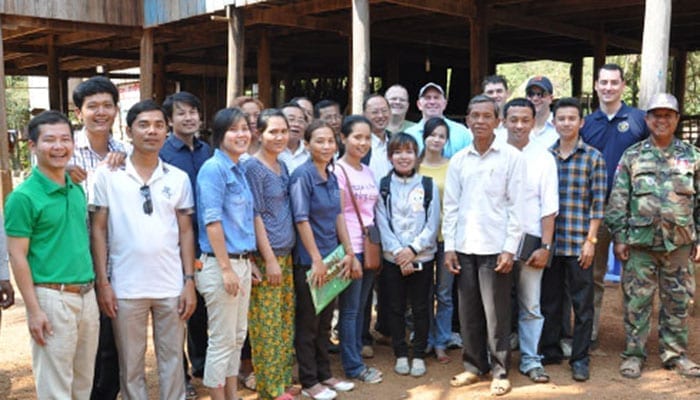The U.S. Naval Medical Research Unit No. 2 (NAMRU-2) has been working for over a decade in the Kampong Cham Province of Cambodia to help establish epidemiological surveillance studies and increase biosecurity capacities.
The mission of NAMRU-2 is to identify infectious disease threats of military and public health importance and develop and evaluate interventions and products to mitigate those threats. NAMRU-2 supports US interests in the Pacific Theater and advances diplomacy in the region by conducting infectious disease research and improving disease surveillance and outbreak response assistance for infectious diseases of critical public health importance to the U.S. and regional partners.
Capacity Building
With funding support provided by the Defense Threat Reduction Agency (DTRA), NAMRU-2 has implemented capacity building renovations projects at the Kampong Cham provincial hospital, including establishing diagnostic testing protocols adapted for disease surveillance in Cambodia, bringing the hospital laboratory facility to operational standards, and providing training on public health principles in the areas of epidemiology, laboratory diagnostics, disease surveillance and outbreak response.
In early 2016, these efforts resulting in the Kampong Cham hospital laboratory being certified as the first regional reference laboratory outside the Cambodian Capital, Phnom Penh.
Acute Febrile Illness Surveillance
NAMRU-2 hosted an interagency meeting last fall in Kampong Cham to coordinate surveillance activities with national stakeholders. During the workshop, data from NAMRU-2 Acute Febrile Illness (AFI) surveillance were reviewed and discussed.
“This study aims to determine the differences in the types of pathogens and the burden of respiratory and enteric diseases among residents from these two distinct geographical regions, in addition to Dengue and Chikungunya viruses as the main vector-borne targets” said Lt. Cmdr. Jamal Dejli, principal investigator of the AFI project.
The AFI surveillance study is funded by the Armed Forces Health Surveillance Branch and is a prospective surveillance study monitoring the burden of vector-borne, acute respiratory and diarrheal diseases among rural and peri-rural villages in Kampong Cham and Tbong Khmum Provinces.
“The workshop was a great success. This was the first interagency meeting to review and discuss our results and to prioritize activities in the future. Everyone in attendance agreed on the importance of the surveillance data gathered on the most prevalent diseases in Cambodia”, said Gary Brice, Director of NAMRU-2, Phnom Penh.
In addition to Cambodia, NAMRU-2 developed and completed multiple field- and hospital-based studies for a variety of infectious diseases of military importance across Southeast Asia, including Vietnam, Malaysia, Laos, and Singapore.
Article adapted from original by NAMRU-2 Public Affairs and CDR Gary Brice, edited for context and format by Global Biodefense.


